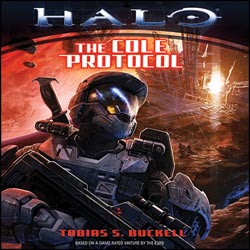The Cole Protocol, written by Tobias Buckell, read by Jonathan Davis. Macmillan Audio, 2009. 9 CDs. (Print edition Tor Books, 2008.)
Tie-in fiction is hard to do well, but when it clicks, the author’s individual vision meshes with the inherited legacy to produce something very distinctive. The Cole Protocol clicks.
The Halo universe does entertaining things with a lot of classic sf tropes. The details are very complicated, but the essentials are simple enough: FTL let humanity spread to dozens of colony worlds over several centuries. Now it’s the 26th century, and humanity’s in a losing war against the alien races united in the Covenant. The Covenant has superior technology and numbers, and is wiping humanity out one sterilized world at a time. Three video games show what happens when several unexpected developments happen at once, and five prior novels expand on that story and cover pieces of backstory.
The first remarkable thing about The Cole Protocol is that it doesn’t require you to know all that massive backstory.
Buckell lays out everything that matters, and does it by demonstration rather than huge info dumps. Here are the policy debates within the United Nations Space Command, and here are the colonial resentments about what feels like UNSC neglect. Here are Covenant leaders scheming and debating, and here are rising ambitious members of various Covenant races showing their individual and collective perspectives. Here are the SPARTANs, UNSC soldiers in cutting-edge powered armor, as they appear to others and as they deal with each other in private times. It’s a story that stands on its own, while also enriching the pool for those up on its legacy.
The second remarkable thing is how much cultural variety Buckell brings in without showing off that he’s doing so. The Halo universe has always been better than average about it: characters come in colors besides generic pasty white and mildly tanned white, and their names and manners suggest H. Beam Piper-esque cultural mixing and re-radiation. Buckell unobtrusively makes culture central to the conflicts among both humans and aliens.
The Cole Protocol takes place almost entirely in a system that used to have an Earthlike world, Madrigal, until the Covenant sterilized it and moved on. Surviving humans, many of them sympathetic to the general insurrection against Earth authority, made new homes in the Rubble, a rich knot of asteroids in the trailing Lagrange point of Hesiod, the system’s largest gas giant. In the generation since Madrigal’s destruction, they’ve built up a new, thriving community…and run into aliens from one of the Covenant races (the Kig-Yar, nicknamed “jackals” for good reasons in the games) who seem more interested in trade than warfare.
There is, of course, a political dimension in these various tensions. But personal and social histories matter too. The Rubble’s people have a society with a strong Hispanic streak, and central protagonist Ignatio Delgaldo has views about family, personal duties, and honor in politics and business that reflect that heritage. Buckell also adds individual and social depth to two characters who’ll play prominent parts in the games, human naval lieutenant Jacob Keyes and Sangheili (“Elite”) Thel ‘Vadamee. They have contexts, responding to (and instigating changes in) worlds that have more than just the plot hooks of the moment.
The third remarkable thing is Buckell’s attention to the differences between military and adventure cliche and real life. In particular, there’s a moment where Earth soldiers cheer on what the brutal torture they assume an expert interrogator is inflicting on a capture insurrectionist. The interrogator, a particularly cold and ruthless character, explains concisely and accurately why torture doesn’t deliver reliable information, and therefore why nobody as serious about gathering useful intelligence as he is would stoop to it. A little later, he also explains several of the ways that military takeover of civilian transportation networks wouldn’t be a long-term gain. I very much enjoyed seeing these coming from someone who is by any sensible standard a badass; it gives that little bit of extra force to a necessary, important little infodump.
The story is a delight, unfolding with…well, with the elegant tangle of asteroids in a Lagrange point, one might say. Delgado has the only set of complete navigational data to survive a SPARTAN team’s Cole protocol-driven system-wide purge by virus and sabotage. Lots of people want it: Earth’s Navy, insurrectionist and other natives of the Rubble, servants of several of the Prophets who direct the Covenant. They also want control of the Rubble’s politics, economy, and continued physical existence. Agendas shift as paths collide repeatedly, with nobody knowing everything they’d like to, and the scale of conflict escalates on up. The pacing is excellent; as with his stand-alone fiction, Buckell handles cliffhangers really well, and gets a great deal done in each compact scene. The climax lays some groundwork for the games and resolves the story of the Rubble and its people very satisfyingly.
I have this in audio format, as noted up at the top. It is one of the best-made audio books in my fairly extensive collection. Jonathan Davis is a very good reader, using accents well, easily distinguishing even closely related characters, and making the pronunciation of all the Covenant vocabulary seem effortless. The physical packaging is also far above the norm. The discs come in two gate-fold binders, one with five pockets, one with four, and each disc has “DISC #” prominently printed in a white oval where it’s easy to see while discs are in their pockets. Anyone who’s tried to chase flimsy single-disc sleeves or wedge them into a barely-sufficient slip case will appreciate the advantages; the rest of you can be happy in your ignorance. It makes me that much more inclined to get other Macmillan Audio releases.










